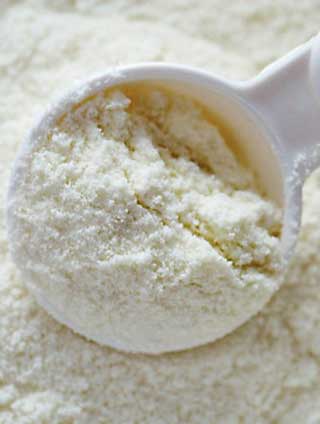Friday Feb 27, 2026
Friday Feb 27, 2026
Tuesday, 15 June 2021 01:40 - - {{hitsCtrl.values.hits}}
 Not linked to the fuel hike but for sheer survival, the full cream milk powder importers are urging for a 37% increase in price, first in two years, a formal request for which the Consumer Affairs Authority (CAA) has not yet responded favourably.
Not linked to the fuel hike but for sheer survival, the full cream milk powder importers are urging for a 37% increase in price, first in two years, a formal request for which the Consumer Affairs Authority (CAA) has not yet responded favourably.
Imports satisfy 80% of Sri Lanka’s Full Cream Milk Powder (FCMP) demand as well as over 65% of Sri Lanka’s total dairy requirement. Imports are mainly sourced from New Zealand and Australia.
The hike sought is after the Global Dairy Trade (GDT) prices for Full Cream and Skimmed Milk Powders have been on an exceptionally high trajectory from January of this year. The main reasons for this unusual hike is due to a combination of seasonal reductions in product availability and persistent demand for milk solids from China and Southeast Asia.
Chinese buyers continued their dominant involvement up to May GDT auctions, lifting the cumulative GDT sales to the region 23% above the prior season. The May sales volumes to the region were the highest on the GDT platform since 2012.
In view of these factors, the GDT auction prices of FCMP has increased to CIF $ 4,350/MT from March, compared to CIF $ 3,300/MT threshold in January, reflecting a 32% increase according to globaldairytrade.info.
Importers fear this scenario is expected to remain till December, as per global industry forecasts.
From July, due to this unprecedented cost escalations, the imported milk powder industry could lose Rs. 2 billion per month at contribution level and is already facing a severe crisis on cash flows.
Importers said they may not be in a position to operate or place new orders without an immediate price increase of Rs. 350 per kg of FCMP from the CAA. This increase has been requested considering the 32% of the cost of goods sold (COGS) increase of bulk milk powder. Current FCMP retail price is Rs. 945 per kg and this should go up to Rs. 1,295 per kg.
Importing companies have requested CAA repeatedly from March for a commensurate price revision. In the absence of that, some importers have already stopped or reduced the ordering by 30-40% from May to mitigate the huge losses.
Through the suggested cost increase, imported FCMP will be more economical than locally produced fresh milk pouches. A litre of reconstituted imported FCMP is approximately Rs. 160 as opposed to Highland Liquid Milk Pouch 1 Litre at Rs. 205.
The rupee fluctuations as against dollar is another factor for a hike along with spiralling of packaging materials and production costs due to COVID-19 constraints, increase of freight rates and overhead increases for the year is severely impacting our industry survivability.
The request for an increase is whilst importers acknowledged the Ministry of Finance decision in March to reduce the Port and Airport Levy which provided an interim relief to sustain the business with difficulty for the last two months. “However, this has become completely inadequate due to the spiralling of global milk powder prices over the last few months,” importers added.
They warned that as the demand for FCMP is continuing to rise globally, any delay in placing orders from June could result in a serious shortage of milk powder in Sri Lanka from July onwards. The current stock levels are sufficient for only four to six weeks. FCMP contributes closer to 18%-20% of the revenue of over 150,000 retailers islandwide and also a key ingredient in over 20,000 tea boutiques and used by the bakery industry as well.
Sources said Sri Lanka will have to rely on imports until local fresh milk production expands further though current supply has to be more than doubled to replace the 90,000 ton of FCMP imported annually. This will require better farm management, high yield milking cattle, availability of fodder and input supplies and new investments, etc.
Despite many challenges and false allegations, imported Full Cream Milk Powder (FCMP) industry has taken all possible steps to supply high quality dairy nutrition to the general public (complying to SLSI standards) and with minimum disruption to honour the Government’s intention of keeping food supply intact, whilst complying to all stringent border clearance requirements and safety protocols by Ministry of Health to control the pandemic situation.
Moreover, some of the milk importing companies have already invested in products using local fresh milk to support the Government’s quest to increase local fresh milk contribution.
